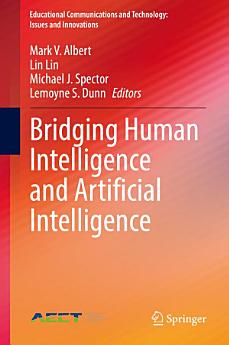Bridging Human Intelligence and Artificial Intelligence
Giới thiệu về sách điện tử này
Giới thiệu tác giả
Mark Albert’s professional goal in life is to leverage machine learning to automate the collection and inference of clinically useful health information to improve clinical research. His projects in wearable sensor analytics have improved the measurement of health outcomes for individuals with Parkinson's disease, stroke, and transfemoral amputations with a variety of additional populations and contexts including children with cerebral palsy as well as healthy toddler activity tracking. Current projects include video-based activity tracking and mobile robotic platforms, all in an effort to improve measures of clinical outcomes to justify therapeutic interventions.
Lin Lin is a Professor of Learning Technologies at the University of North Texas. Lin received her doctoral degree at Teachers College, Columbia University. Lin’s research focuses on human-technology interactions, and life-long learning with innovative pedagogies and technologies. Specifically, she has published research in media multitasking, cognitive off-loading, multimedia design, executive functions, and (AI, VR) technology-supported STEM and STEM-enabling skills. Currently, Lin serves as the Director of Texas Center for Educational Technology (TCET). She also serves as the Editor-in-chief of one of the top-tier journals, Educational Technology Research and Development (ETR&D Development Section).
J. Michael Spector is Professor at UNT, was previously Professor of Educational Psychology at the University of Georgia, Associate Director of the Learning Systems Institute at Florida State University, Chair of Instructional Design, Development and Evaluation at Syracuse University, and Director of the Educational Information Science and Technology Research Program at the University of Bergen. He earned a Ph.D. from The University of Texas. He is a visiting research professor at Beijing Normal University, at East China Normal University, and the Indian Institute of Technology-Kharagpur. His research focuses on assessing learning in complex domains, inquiry and critical thinking skills, and program evaluation. He was Executive Director of the International Board of Standards for Training, Performance and Instruction and a Past-president of the Association for Educational and Communications Technology. He is Editor Emeritus of Educational Technology Research & Development; he edited two editions of the Handbook of Research on Educational Communications and Technology and the SAGE Encyclopedia of Educational Technology and more that 150 publications to his credit.
Lemoyne S. Dunn is an Adjunct Graduate Faculty member at UNT who previously served as Director of a Title III Grant and as a Project Director for the Intel Teach to the Future program training over 22,000 educators in north and west Texas. She also served as a Lead Evaluator for three of the seven TARGET grants evaluated by the Texas Center for Educational Technology. She earned her PhD from UNT, as well as two Masters degrees and multiple certificates and endorsements. Her B.S. is from Texas A&M University. Her areas of interest include Educational Technology, Cognitive Science, and Gifted Education.





